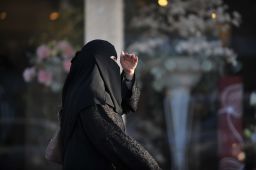Story highlights
Saudi Arabia strips religious police of power to arrest
Kingdom's leadership suggests individuals be reported to police instead
Changes come amid calls from public to clarify force's powers
Saudi Arabia has stripped its religious police of the power to arrest when carrying out duties and enforcing Islamic law.

Under the new directives approved on Tuesday, members of the force – formally known as the Commission for the Promotion of Virtue and Prevention of Vice – can no longer detain people they identify as breaking the kingdom’s strict standards of moral conduct.
Now, the so-called Haia force must report individuals’ “misbehaviors” to the police or drug police, the official Saudi Press Agency reports.
“They alone have the authority to follow, chase, stop, question, verify identification, arrest any suspected persons,” the decree states.
Tactics under fire
Fawaz Gerges, professor of Middle Eastern studies at the London School of Economics, described the update in regulations from the Saudi Cabinet as a “significant development.”
“In the past few years there have been many complaints by the public that the religious police has overstepped it’s authority, that it has misbehaved, that has mistreated families, that it has overreached,” he said.
“It’s a very, very controversial issue inside Saudi Arabia. Obviously the leaders of Saudi Arabia, the political leaders, have decided that the religious police is doing more damage than good and they are very much concerned with the popular misgivings about recent incidents in the kingdom.”
He added: “[The change in powers] establishes restrictions on the ability of the religious police and it basically protects citizens from the misbehavior of one particular individual within the religious police.”
Historically, the role of Saudi Arabia’s religious police has been to ensure Islamic laws – such as prohibition of alcohol and drugs, gender segregation and making sure women are appropriately covered – are adhered to.
Gerges said many of the incidents that have increased public debate around the role of the country’s religious police have centered around its treatment of women.
“Most of the grievances have focused on women – women who are not fully covered, women who are not with their own guardians … that’s why we call it moral police.
“It targets women who do not play by the rules, the religious rules.”
One such incident occurred in February when a video emerged on social media platforms of two women appearing to be chased and allegedly assaulted by members of the religious police near a Riyadh shopping mall. The incident sparked nationwide outrage, the Gulf News reported at the time.
A ‘balancing’ act
But while this is a “positive step” from a public point of view, Gerges said the move should not be mistaken as the beginning of significant social reform across the country.
He said King Salman, who inherited the throne in January 2015, is “very much liked by the ultraconservative religious authority” but is trying to ease civic tensions and find a middle ground.
His predecessor, the late King Abdullah, was seen as a “liberal” reformer.
“We should not over-read into this particular decision. It is a balancing act; it is designed to respond to grievances which have been aired against the religious police.
“It is a delineation of the religious police’s authority on the part of the political leadership and creating limits between the religious police and the regular police.”
He added: “So in this particular sense, it shouldn’t be seen as part of a major initiative or reform movement in the kingdom.”






